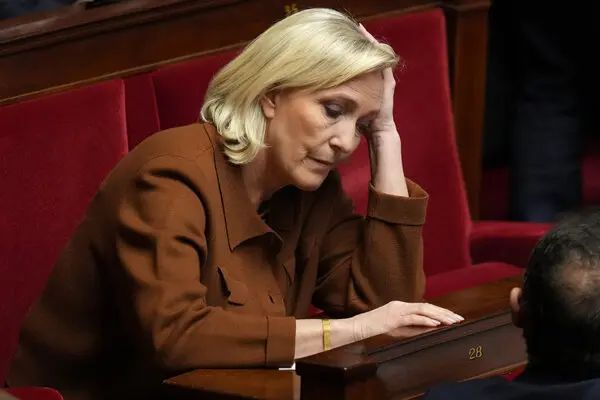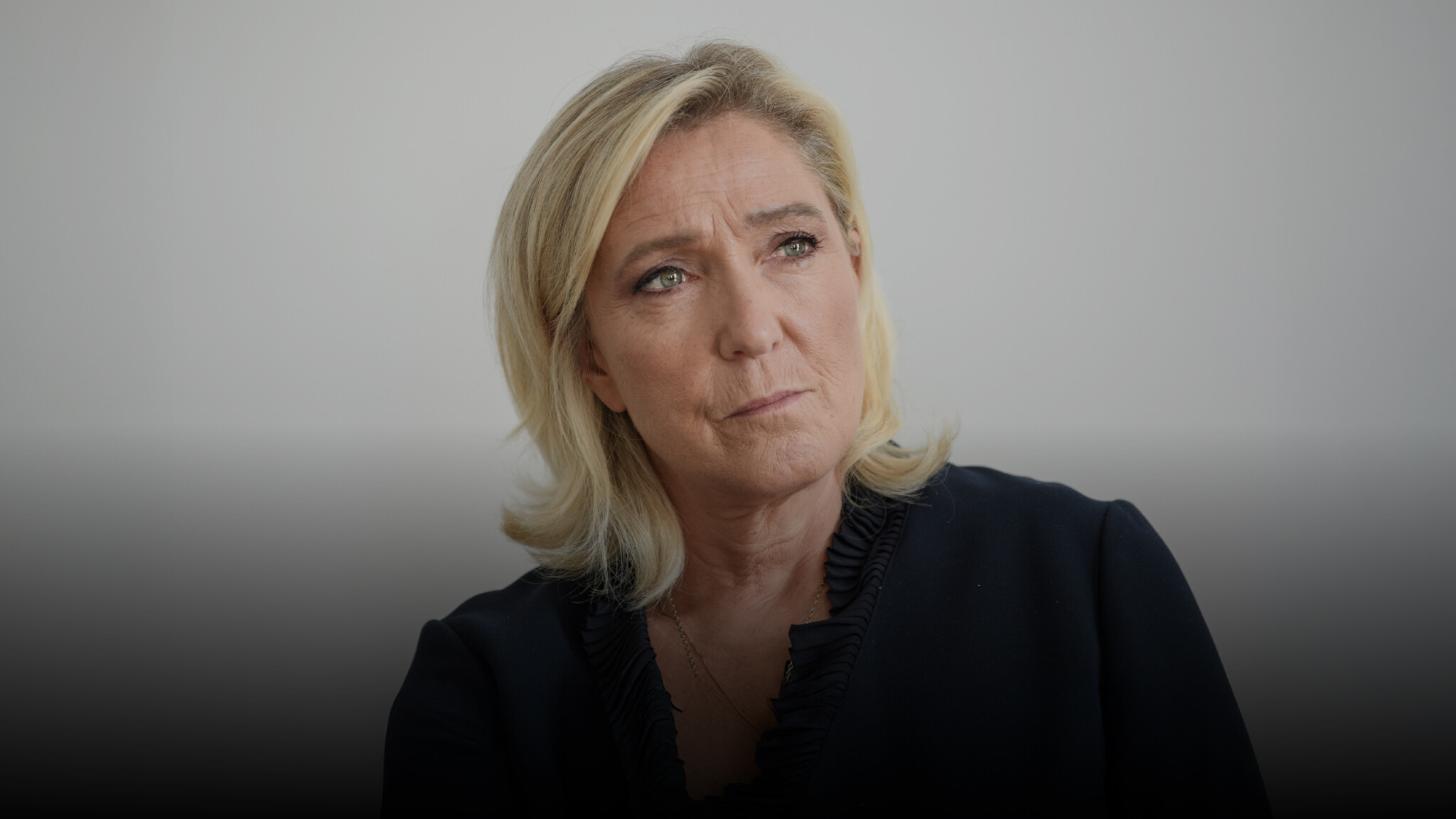
In a shocking decision that took the French political establishment by surprise, Paris’s criminal court yesterday banned National Rally (RN) leader Marine Le Pen from running for elected office for five years. This effectively ends her bid for the presidency in 2027, upending the race to succeed President Emmanuel Macron and deepening the political chaos in a country already contending with a weak minority government, a hung parliament and an unpopular president. The dramatic judicial intervention into the presidential campaign also threatens to deny voters the chance to vote for the candidate who is well ahead in all opinion polls. Jordan Bardella, the 29-year-old National Rally president and Le Pen’s heir-apparent, declared after the ruling that “French democracy has been executed”.
Along with 24 other codefendants, Ms Le Pen was accused of illegally using European Parliament funds to pay for party employees who primarily or exclusively dealt with national party business. The judges found that the accused had over 12 years between 2004 and 2016 improperly used more than €4 million ($4.4m) for this purpose, of which Le Pen was held personally responsible for €474,000. Although the court ruled that there was no personal enrichment involved for her or fellow party figures, it found all but one of them guilty and handed down a mix of fines, ineligibility bans and prison sentences. The National Rally party was also found guilty and handed a €2 million fine, though that can be reduced by €1 million if it does not repeat the offence.
Enjoy independent, ad-free journalism - delivered to your inbox each week
The harshest punishment was reserved for Le Pen, as she was convicted of criminal activity both as a former MEP and for running it as the party’s ex-president. Ms Le Pen was also ordered to pay a €100,000 fine and given a prison sentence of four years, two of them suspended and two under house arrest.
Why Is This Suspicious?
Her detractors in the press are calling this embezzlement, but to her supporters the offence itself is a technicality and the sentence of disqualification is outright lawfare. They are correct to regard it as dubious. Although the prosecution presented convincing evidence against the defendants – including text messages from one parliamentary assistant who, months into his employment, still hadn’t met the MEP he was supposedly working for – a mere conviction on the charge of misuse of EU funds would not have prevented Ms Le Pen from running in 2027: it is the specific decision to ban her from political activity for five years that makes her punishment look political. Before the ruling was announced, the RN leader said that she would consider such an outcome “profoundly anti-democratic”.
Suspicions are heightened by the fact that the ruling is also unusually harsh in carrying an immediate sentence, which means the ban applies even if and while she appeals. Prosecutors took the extraordinary step of asking the three-judge panel presiding over the case for this deviation from French judicial norms when the trial hearing closed last November. To the shock of the defendant, the judges agreed, citing the gravity of Le Pen’s crime. They did so even while barring her co-accused from public office only for shorter periods; Louis Aliot, the mayor of Perpignan and member of the party’s national bureau, was not given an immediate sentence at all.
Suspicions are heightened by the fact that the ruling is also unusually harsh in carrying an immediate sentence, which means the ban applies even if and while she appeals. Prosecutors took the extraordinary step of asking the three-judge panel presiding over the case for this deviation from French judicial norms when the trial hearing closed last November.
Le Pen’s defenders are also quick to point out that practically every French political party has resorted to illegally financing their national parties using EU parliament funds; Prime Minister Bayrou himself once faced similar allegations, and while the prime minister was acquitted last year for lack of evidence other members of his party were found guilty. The club is notorious for such financial irregularities: the EU anti-fraud watchdog found misconduct worth €1.77 billion in 2022 alone. Other financial crimes by French politicians have also been treated far more leniently: a 2016 guilty verdict for Christine Lagarde on similar charges to Le Pen, also in a French court, saw her not only keep her job as head of the International Monetary Fund, but since then become president of the European Central Bank.
For all that Le Pen foolishly gave the system the stick to beat her with, National Rally supporters therefore have a point when they argue that their leader is being made the victim of a system of selective prosecution and disproportionate punishment by an establishment intent on eliminating them from the political game by ulterior means. Even many of her political rivals condemned yesterday’s verdict along these lines. French media reported that centrist Prime Minister François Bayrou was “troubled” by the ruling, while centre right Justice Minister Gérald Darmanin said in November that it would be “deeply shocking” if Le Pen were declared ineligible and unable to stand in future elections; Le Pen must be defeated “at the ballot box, not elsewhere.” Even the Left is divided over it: Éric Coquerel of La France Insoumise said “I don’t agree that things that should be decided by the ballot box are decided by the courts.”
Yet there is a disturbing trend of similar treatment being meted out to national populist parties and politicians across the West. The possibility of Le Pen being barred from running for public office comes just a fortnight after Calin Georgescu was judicially disqualified from running in the Romanian election, despite winning the first round convincingly last year and soaring in the polls since then. It also echoes the legal travails of Donald Trump, who had to face down multiple impeachments and prosecutions characterised by disregard for precedent and tendentious application of charging protocols during his battle to return to the White House; had he lost, he would likely be facing decades in jail. Italy’s Deputy Prime Minister Matteo Salvini faced a potential ban from public office for blocking a boat carrying illegal immigrants, and although the courts finally found him not guilty last December, he had the prospect of jail time hanging over him since 2021 for exercising his democratically granted powers. In Poland Donald Tusk’s centrist government is trying to prosecute various members of the previous right wing government, while in Germany over one hundred legislators supported unsuccessful efforts to ban the AfD ahead of last month’s election. All this lawfare is in addition to efforts to censor populist expression, quarantine popular opposition parties, and even annul unwelcome election results altogether (as in Romania) of the sort that US Vice President JD Vance denounced in his Munich speech in February.

Populist leaders in the West face legal challenges and disqualification attempts, from Le Pen to Trump, Salvini, and others, amid efforts to suppress opposition.
What Comes Next?
In the short term, it’s President Emmanuel Macron’s government that might take the hit. Ms Le Pen remains a member of the National Assembly, where she leads a bloc of 125 – the parliament’s largest. Up to now she has refrained from trying to bring down embattled prime minister Francois Bayrou, who lacks a parliamentary majority. But she could well react to the court judgment by reviving the sort of trouble making she displayed last December, immediately after the prosecutors’ decision to seek an immediate ban on her running for office, when her party’s vote helped to topple his centre-right predecessor, Michel Barnier. This time the RN could table a motion of no confidence over energy policy, which could be successful if other opposition parties – it would need the left to join in – decide to vote in favor.
Even if she decides to hold off on such revenge, a more hostile right wing can still obstruct laws and make Bayrou more dependent on the Socialist Party. That in turn will make it harder for France to cut its debt, set to reach 120% of GDP by the end of the year, as well as muster the extra spending President Macron has pledged to boost its military. And the political imbroglio will likely keep bond yields high on French public debt, hurting the economy and government finances.
In the longer term, the political effects are less clear. For the time being, Le Pen’s conviction has been welcomed by much of the Parisian commentariat as a setback for her Rassemblement National party. But it could easily backfire.
On the one hand, Marine Le Pen is a huge asset to the RN and the party, shocked by the severity of the sentence, lacks an equivalently strong candidate for 2027. She will appeal, but there is no guarantee that a hearing will take place in time either to overturn the verdict or to reduce the sentence. If not, and if she is unable to get the country’s constitutional council to suspend the ruling on democratic grounds, the nomination will probably fall to her protége, Jordan Bardella. But even many party members doubt that the 29 year old is yet ready for the rigours of a Presidential campaign.
She will appeal, but there is no guarantee that a hearing will take place in time either to overturn the verdict or to reduce the sentence. If not, and if she is unable to get the country’s constitutional council to suspend the ruling on democratic grounds, the nomination will probably fall to her protége, Jordan Bardella. But even many party members doubt that the 29 year old is yet ready for the rigours of a Presidential campaign.
Although he is a star on TikTok and a smooth media performer, he had been expected to continue his apprenticeship as Le Pen’s prime minister, not president, and probably owes much of his success to their double act – his slickness and youth contrasting with her battle hardened stature and experience. On his own, he might struggle to differentiate himself from center right-wing candidates such as Interior Minister Bruno Retailleau and Eric Ciotti. Nonetheless, he will probably be their best option: an Ifop poll published Sunday shows him taking a similar share of votes to Le Pen for the first round of the 2027 presidential election, but performing slightly below her in a hypothetical runoff against a centrist candidate.
On the other hand hand, Le Pen may yet prevail in her appeal against the ban. But even if not, her party will be hoping that it is not because of her personality that they are enjoying unprecedented popularity. Instead, they are rising in the polls because they have dared to touch on the topics which the establishment parties in France have for decades refused to discuss: replacement migration, Islamism, cultural decline and economic stagnation. Attempts to ban candidates rather than engage with the substance of what surging populist parties are demanding is doomed to fail so long as these overriding problems remain unaddressed – an analysis supported by the fact that attempts to crush democratic populism via lawfare elsewhere in the West have ended up boomeranging badly. After all, Donald Trump easily won re-election while the AfD came second in last month’s German election; the Austrian Freedom Party is in first place in the polls despite being kept from forming a government, and Calin Georgescu is flying high in the polls after his election win was annulled by Romania’s courts. If Le Pen and her party’s sense of outrage lasts for the next two years then even if if she is prevented from running for the Presidency again, the same backlash could well prove to be a powerful force in 2027.




Comments (0)
Only supporting or founding members can comment on our articles.